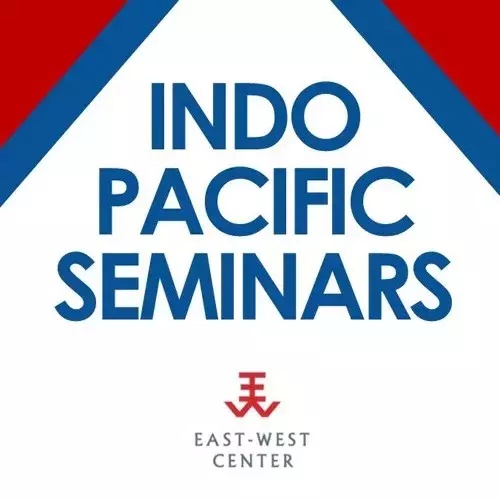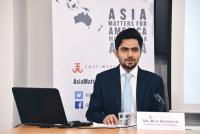
OFFICE/DEPARTMENT
US-Pakistan Relations: Challenges and Prospects to Pivot from AFPAK to Indo-Pacific
An Indo-Pacific Foreign Policy and Defense Seminar featuring:
Mr. Riaz Khokhar
Asia Studies Visiting Fellow,
East-West Center in Washington
Dr. Daniel S. Markey (Discussant)
Senior Research Professor in International Relations &
Academic Director, Master of Arts in Global Policy, Johns Hopkins SAIS
Dr. Satu P. Limaye (Moderator)
Vice President, East-West Center &
Director, East West Center in Washington
For almost two decades, the US-Pakistan relationship has remained fixated on cooperation in Afghanistan and counter-terrorism efforts. Meanwhile, China has made major inroads into Pakistan through the China-Pakistan Economic Corridor (CPEC),

a $60 billion flagship energy and infrastructure project of the Belt and Road Initiative (BRI).
Within this context, Mr. Riaz Khokhar proposed that it will be an effective strategy for the United States to engage with Islamabad economically by providing the country with alternative investment options. This may help the country move from too close an alignment with China to a position where it does not harm the US’ strategic interests. He also proposed that Islamabad should remain nonaligned in the US-China competition and address the concerns of the international community regarding excessive Chinese influence and the alleged patronage of militants.
He drew on the perspectives of experts, diplomats, and government officials from both Washington and Islamabad regarding the prospects of and challenges to his proposed strategy.
Read his Asia Pacific Bulletin on this topic.
For more images, please visit the album for this event on the East-West Center's Flickr page.
SPEAKER BIOGRAPHIES
Riaz Khokhar is a research assistant with the Center for International Strategic Studies (CISS), Islamabad. He is currently working as a Visiting Fellow Asia Studies at the East-West Center, in Washington D.C., April through June 2019, where he will publish a research paper, an opinion article, and deliver a public talk on his work. His research interests include foreign policy and political economy of South Asia. He also experienced in coordinating with other researchers in organizing and managing seminars and conferences. He has published two research articles in the CISS Insight, a biannual journal of the Center. His foreign policy analysis has been featured in the East-West Center’s Asia-Pacific Bulletin series, The National Interest, Newsweek Pakistan, Pakistan Politico, The Express Tribune, and Daily Times.
Dr. Daniel S. Markey is senior research professor at Johns Hopkins University’s School of Advanced International Studies (SAIS) and the academic director of the Master of Arts in Global Policy. From 2007-2015, he was senior fellow for India, Pakistan, and South Asia at the Council on Foreign Relations. While there, he wrote a book on the future of the US-Pakistan relationship, No Exit from Pakistan: America's Tortured Relationship with Islamabad (Cambridge University Press, 2013). He is currently writing a book on the geopolitics of China's new role in continental Eurasia, which will be published in spring 2020. From 2003 to 2007, Dr. Markey held the South Asia portfolio on the Secretary's Policy Planning Staff at the US Department of State. Prior to government service, he taught in the Department of Politics at Princeton University, where he served as executive director of Princeton's Research Program in International Security. Earlier, he was a postdoctoral fellow at Harvard's Olin Institute for Strategic Studies. Dr. Markey is the author of numerous reports, articles, book chapters, and opinion pieces. His commentary has been featured widely in US and international media.
Satu Limaye is Vice President of the East-West Center and the Director of the East-West Center in Washington where he created and now directs the Asia Matters for America initiative and edits the Asia Pacific Bulletin. He is also a Senior Advisor at CNA Corp (Center for Naval Analyses) and Senior Fellow on Asia History and Policy at the Foreign Policy Institute at Paul H. Nitze School of International Studies (SAIS). He is a magna cum laude and Phi Beta Kappa graduate of Georgetown University and received his doctorate from Oxford University (Magdalen College) where he was a George C. Marshall Scholar. Dr. Limaye publishes and presents on a range of Indo-Pacific issues. Recent publications include: Raging Waters: China, India, Bangladesh and Brahmaputra River Politics (with Nilanthi Samaranayake and Joel Wuthnow); Why ASEAN is Here to Stay and What that Means for the US; The United States-Japan Alliance and Southeast Asia: Meeting Regional Demands; and Weighted West: The Indian Navy’s New Maritime Strategy, Capabilities, and Diplomacy.
US-Pakistan Relations: Challenges and Prospects to Pivot from AFPAK to Indo-Pacific
An Indo-Pacific Foreign Policy and Defense Seminar featuring:
Mr. Riaz Khokhar
Asia Studies Visiting Fellow,
East-West Center in Washington
Dr. Daniel S. Markey (Discussant)
Senior Research Professor in International Relations &
Academic Director, Master of Arts in Global Policy, Johns Hopkins SAIS
Dr. Satu P. Limaye (Moderator)
Vice President, East-West Center &
Director, East West Center in Washington
For almost two decades, the US-Pakistan relationship has remained fixated on cooperation in Afghanistan and counter-terrorism efforts. Meanwhile, China has made major inroads into Pakistan through the China-Pakistan Economic Corridor (CPEC),

a $60 billion flagship energy and infrastructure project of the Belt and Road Initiative (BRI).
Within this context, Mr. Riaz Khokhar proposed that it will be an effective strategy for the United States to engage with Islamabad economically by providing the country with alternative investment options. This may help the country move from too close an alignment with China to a position where it does not harm the US’ strategic interests. He also proposed that Islamabad should remain nonaligned in the US-China competition and address the concerns of the international community regarding excessive Chinese influence and the alleged patronage of militants.
He drew on the perspectives of experts, diplomats, and government officials from both Washington and Islamabad regarding the prospects of and challenges to his proposed strategy.
Read his Asia Pacific Bulletin on this topic.
For more images, please visit the album for this event on the East-West Center's Flickr page.
SPEAKER BIOGRAPHIES
Riaz Khokhar is a research assistant with the Center for International Strategic Studies (CISS), Islamabad. He is currently working as a Visiting Fellow Asia Studies at the East-West Center, in Washington D.C., April through June 2019, where he will publish a research paper, an opinion article, and deliver a public talk on his work. His research interests include foreign policy and political economy of South Asia. He also experienced in coordinating with other researchers in organizing and managing seminars and conferences. He has published two research articles in the CISS Insight, a biannual journal of the Center. His foreign policy analysis has been featured in the East-West Center’s Asia-Pacific Bulletin series, The National Interest, Newsweek Pakistan, Pakistan Politico, The Express Tribune, and Daily Times.
Dr. Daniel S. Markey is senior research professor at Johns Hopkins University’s School of Advanced International Studies (SAIS) and the academic director of the Master of Arts in Global Policy. From 2007-2015, he was senior fellow for India, Pakistan, and South Asia at the Council on Foreign Relations. While there, he wrote a book on the future of the US-Pakistan relationship, No Exit from Pakistan: America's Tortured Relationship with Islamabad (Cambridge University Press, 2013). He is currently writing a book on the geopolitics of China's new role in continental Eurasia, which will be published in spring 2020. From 2003 to 2007, Dr. Markey held the South Asia portfolio on the Secretary's Policy Planning Staff at the US Department of State. Prior to government service, he taught in the Department of Politics at Princeton University, where he served as executive director of Princeton's Research Program in International Security. Earlier, he was a postdoctoral fellow at Harvard's Olin Institute for Strategic Studies. Dr. Markey is the author of numerous reports, articles, book chapters, and opinion pieces. His commentary has been featured widely in US and international media.
Satu Limaye is Vice President of the East-West Center and the Director of the East-West Center in Washington where he created and now directs the Asia Matters for America initiative and edits the Asia Pacific Bulletin. He is also a Senior Advisor at CNA Corp (Center for Naval Analyses) and Senior Fellow on Asia History and Policy at the Foreign Policy Institute at Paul H. Nitze School of International Studies (SAIS). He is a magna cum laude and Phi Beta Kappa graduate of Georgetown University and received his doctorate from Oxford University (Magdalen College) where he was a George C. Marshall Scholar. Dr. Limaye publishes and presents on a range of Indo-Pacific issues. Recent publications include: Raging Waters: China, India, Bangladesh and Brahmaputra River Politics (with Nilanthi Samaranayake and Joel Wuthnow); Why ASEAN is Here to Stay and What that Means for the US; The United States-Japan Alliance and Southeast Asia: Meeting Regional Demands; and Weighted West: The Indian Navy’s New Maritime Strategy, Capabilities, and Diplomacy.









